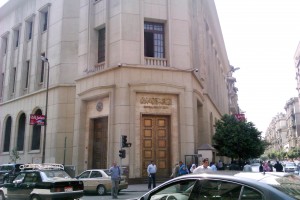
(Abdelazim Saafan/DNE Photo)
By Doaa Farid
The Central Bank of Egypt’s (CBE) decision on Thursday to keep interest rates unchanged after two consecutive cuts was an expected move, analysts say, given rising inflation rates and falling “family sector” deposits in banks.
The Monetary Policy Committee (MPC) at the CBE has maintained overnight deposit rates at 8.75%, the overnight lending rate at 9.75% and rate of the CBE’s main operations at 9.25%. The discount rate was also kept unchanged at 9.25%.
Banking expert Ahmed Adam said that the move was expected, as the central bank would have been unable to lower interest rates after the rise in inflation.
Economic and banking expert Bassant Fahmy agreed, saying that if rates had been increased, it would have “created problems in the general budget”, while cutting them would have forced depositors to withdraw their deposits from banks.
The CBE statement also noted that the “Consumer Price Index (CPI) increased by 1.75% in September, bringing the annual rate to 10.15% in September from 9.74% in August.”
The statement added that the latest monthly developments in both headline and core inflation were driven by increases in several food prices combined with a number of non-food prices.
“The pronounced downside risks to domestic GDP combined with the persistently negative output gap since 2011 will limit upside risks to the inflation outlook going forward,” the bank said. When weighing inflation risk against GDP outlook, it said, the MPC had judged current rate level as “appropriate.”
Adam said another reason for the decision was the rise in Egypt’s gross domestic debt, which was up almost 24% in 2012/2013 fiscal year to reach EGP 1.5tn.
The CBE announced earlier in October that gross domestic debts amounted to 87.5% of GDP in 2012/2013.
The bank cut rates by 1% after reducing overnight interest rates in September by 50 basis points, the second half-point cut since August. The move had previously viewed by experts as a means of boosting the economy and a reasonable reaction to the high volume of liquidity in banks.
According to Adam, the previous 1% cuts in interest rates have negatively affected customers’ deposits.
Echoing that opinion, former vice chairman for the Principal Bank for Development and Agriculture Credit Tarek Helmy said it is normal to maintain interest rates at current levels because of the decline in deposits from the “family sector, who always want high rates over their own deposits”.
“If the inflation rate is higher than interest rates, as with the current situation, the deposits in banks are affected,” Helmy said. The government decision, he said, came after weighing the ill effects on the family sector lower interest rates would provide against its support in lowering the deficit.
According to CBE figures from September, total non-CBE deposits into the banking system rose by about EGP 21bn in June, a 1.8% increase. This was seen by experts as an “economic deflation” indicator, as it signals that investors attach greater risk to investing their capital.
Helmy added that decreasing interest rates would lower the cost of borrowing from banks for the state as well. “Every 1% of reduction saves around EGP 1bn for the government,” he stated.
However, Adam pointed out that under normal conditions, interest rates must rise. “Before the last reduction in September, interest rates were high,” he said, noting that the CBE had reduced rates to help banks support the economy.
Fahmy said the amount of time interest rates remain flat will be determined by MPC, which will closely monitor the situation.




